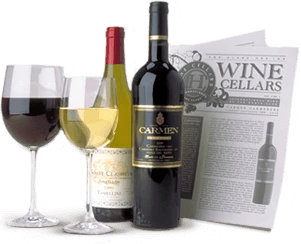A deeply colored, intense Carmenère, the 2007 Carmen Rapel Valley Carmenère highlights the attributes of Chile’s special red varietal. For starters, it provides a compelling bouquet of red and black fruits, roses, and chocolate that continuously expands as the wine rests in the glass. In the mouth this Carmenère continues to work its magic as it offers up a wealth of flavors to tantalize the palate: raspberry, dark chocolate, pepper, plum, roasted coffee, and spice all come front and center and linger in the mouth long after the wine has made its exit. Moreover, the seductive finish of the 2007 Carmen Carmenère is heightened by a dollop of ripe tannin wrapped around deft touches of cassis and wood smoke. An artful blend of 85% Carmenère and 15% Cabernet Sauvignon, Carmen has fashioned a flavorful, textured Bordeaux-style wine to electrify the senses. We found Carmen’s Carmenère to be charming from the moment we opened it. Nevertheless, it continued to open and develop for up to several hours, so we suggest you allow the 2007 Carmen Carmenère time to air before consuming. Enjoy!
For Carmenère aficionados the 2007 Carmen Carmenère requires nothing but a clean glass. However, Carmen’s delightful 2007 Carmenère complements a wide variety of foods. It also has the uncanny ability to elevate good home cooking to the level of haute cuisine, so that marinated flank steak, homemade pastas, creamy risottos, and spicy eggplant dishes constitute some of our favorite accompaniments to this wine. Baby back ribs, Texas barbecue, and a hearty dish of black beans and rice offer superb companionship to this wine, too, as these heady dishes pose no threat to the flavorful 2007 Carmen Carmenère. Mom’s mid week meatloaf will do nicely as well. Buen Provecho!
Carmen is an amazing property. Furthermore, this great Chilean estate has the uncanny ability to consistently turn out top notch wines from each of its premium varietals, and the 2007 Carmen Rapel Valley Carmenère is indeed another great effort from Chile’s “grande dame” of exquisite properties.
Carmen is Chile’s oldest wine brand, dating back to 1850. A century and a half ago Christian Lanz founded Viña Carmen and lovingly named the estate’s beautiful vineyards for his wife. Today, Viña Carmen remains the showpiece Lanz envisioned more than a century and half ago. Combining tradition, superb vineyards and a state of the art winery that was constructed in 1992, Viña Carmen is currently South America’s leading winery as well as its oldest. In the 1990’s, winemaker Alvaro Espinoza, a proponent of organic viticulture, moved Carmen to the forefront of South American producers and brought international renown to this venerable property, a position it retains today under winemaker María del Pilar González. Wine & Spirits magazine has named Carmen “Top Winery of the Year” at least four times and current offerings look to be some of the finest this winery has produced to date.
Presently, the more than 500 acres of Carmen Vineyards spread across several valleys and many micro-climates surrounding Chile’s capital, Santiago. This constellation of microclimates allows Carmen to select the best grape varieties for each area and to excel with many different grapes and styles of wine. The winery has been extremely successful with French varietals, including the unique, lesser-known Bordeaux varietals, including Chile’s own “indigenous” grape, Carmenère.
Internationally renowned winemaker Alvaro Espinoza, who joined Carmen in 1993 and helped boost the winery’s stellar reputation, was instrumental in isolating and identifying Carmenère as a unique grape variety. He then went on to produce some of South America’s most exciting Carmenère based wines. Alvarez also instituted organic farming at Carmen, which continues to expand under present winemaker María del Pilar González. Presently, Carmen uses no pesticides in their vineyards and is leading the way in Chile toward more environmentally sensitive viticulture. In addition, many of Carmen’s wines are bottled unfiltered. The winery has also made the commitment to use lighter bottles in an effort to cut waste and reduce the environmental impact of transport.
Carmenère
Carmenère is a grape varietal that has virtually disappeared from its native Bordeaux, but quite literally this little known varietal has been resurrected or at the very least born again. Like the mythical phoenix that rises from the ashes, Carmenère has a new lease on life. After more than a century of obscurity, this flavorful, difficult to grow red grape variety is alive and well in Chile. It grows especially well in the scenic Colchagua and Rapel Valleys, where it ripens fully and is considered by its adherents to be next to godliness.
For a very long time, many in Chile believed or at least wanted to believe for commercial purposes that Carmenère was a clone of Merlot. And although there are some obvious differences in leaf appearance as well as the size and flavor of their fruit, both varieties had grown up alongside each other in Chilean vineyards for generations, with no distinction made between them. However, Carmenère is in fact a distinct varietal that carries its own set of attributes and characteristics. After years of speculation and extensive experimentation that culminated in 1994 with DNA testing and a positive identification by French ampelographer (vine expert) Jean-Michel Boursiquot, the true identity of Carmenère was established, or more accurately, re-established.
Like fine red Bordeaux, Carmenère complements a wide array of cheeses. It pairs beautifully with Cantal, Port Salut, and many other traditional French cheeses. It also holds up nicely to hard and crusted Italian cheeses. For more delicious cheese selections and additional information on our outstanding international gourmet cheese club, please visit us at www.cheesemonthclub.com to enjoy all that life has to offer!

Enjoy Limited Production Estate
Bottled Wines
Discover limited production estate bottled wines such as Vergenoegd's internationally
acclaimed 2005 Cabernet Sauvignon, imported exclusively for our members.

